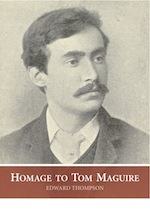The ILP have re-published EP Thompson’s celebrated 1960 pamphlet on Leeds ILPer, poet, propagandist and photographer Tom Maguire with a new introduction by Labour historian David Howell and an additional profile by former Labour MP, John Battle.
 Maguire was, according to Howell’s introduction, “the personification of the marginalised”, a radical organiser who played a vital role in the Leeds gas strike of 1890 but died in poverty five years later at the tragically young age of 29.
Maguire was, according to Howell’s introduction, “the personification of the marginalised”, a radical organiser who played a vital role in the Leeds gas strike of 1890 but died in poverty five years later at the tragically young age of 29.
Homage to Tom Maguire was originally written as a contribution to a book of essays published as a memorial to the socialist scholar GDH Cole, who had died in January 1959.
It was, according to Howell, “the product of a dramatic moment in Thompson’s intellectual and political life”, coming soon after he had left the Communist Party as he sought to “construct a Marxism with a moral core that could celebrate and empower the creativity of the many and subvert the pretensions of elites, whether vanguard parties or cloistered academics”.
Thompson, he writes, “sought to reform radical politics so it could challenge both a discredited Communist Party and a Labour Party preoccupied with narrow electoral calculations. The recovery of such spontaneity from the early years of the socialist movement offered him not just an awareness of a richer past … but also an optimism that could inspire contemporary struggles.
“Homage to Tom Maguire presents a vital episode in the emergence of an independent labour politics,” he adds, while it also anticipates “the themes, style and methodology of Thompson’s classic, The Making of the English Working Class”.
The pamphlet is published in memory of two Leeds ILPers of later vintage, Walt and Annie Mallorie, who played a vital role in the local ILP over several decades.
The 40-page A5 pamphlet costs £5 (including p&p) and can be ordered now from the Publications page of this website, or by sending a cheque made out to ‘ILP Trust’ to ILP, PO Box 222, Leeds, LS11 1DF.
—-
See also: ‘ILP@120: Tom Maguire – A Leeds Pioneer’, by John Battle.


